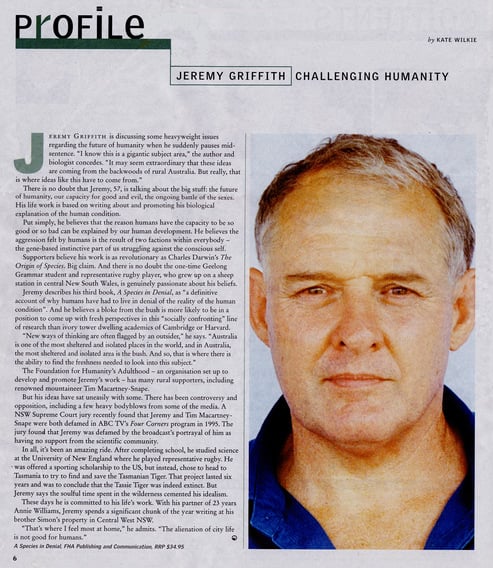Friday Magazine Profile
The Friday Magazine reaches 92% of all farms in
Australia and has a combined circulation of 130,000.
The following full-page article appeared in the 3 July 2003 edition of Friday Magazine, a monthly colour magazine that is distributed in The Land newspaper in NSW, the Queensland Country Life, the North Queensland Register, the Stock and Land (which covers regional and rural Victoria), the Stock Journal (which covers regional and rural South Australia), and Farm Weekly (which covers regional and rural Western Australia).
The text in the above article is reproduced below:
PROFILE : JEREMY GRIFFITH CHALLENGING HUMANITY
By Kate Wilkie
JEREMY GRIFFITH (/jeremygriffith) is discussing some heavyweight issues regarding the future of humanity when he suddenly pauses mid sentence. “I know this is a gigantic subject area,” the author and biologist concedes. “It may seem extraordinary that these ideas are coming from the backwoods of rural Australia. But really, that is where ideas like this have to come from.”
There is no doubt that Jeremy, 57, is talking about the big stuff: the future of humanity, our capacity for good and evil, the ongoing battle of the sexes. His life work is based on writing about and promoting his biological explanation of the human condition.
Put simply, he believes that the reason humans have the capacity to be so good or so bad can be explained by our human development. He believes the aggression felt by humans is the result of two factions within everybody—the gene-based instinctive part of us struggling against the conscious self.
Supporters believe his work is as revolutionary as Charles Darwin’s The Origin of Species. Big claim. And there is no doubt the one-time Geelong Grammar Student and representative rugby player, who grew up on a sheep station in central New South Wales, is genuinely passionate about his beliefs.
Jeremy describes his third book, A Species in Denial, as “a definitive account of why humans have had to live in denial of the reality of the human condition”. And he believes a bloke from the bush is more likely to be in a position to come up with fresh perspectives in this “socially confronting” line of research than ivory tower dwelling academics of Cambridge or Harvard.
“New ways of thinking are often flagged by an outsider,” he says. “Australia is one of the most sheltered and isolated places in the world, and in Australia, the most sheltered and isolated area is the bush. And so, that is where there is the ability to find the freshness needed to look into this subject.”
The Foundation for Humanity’s Adulthood—an organization set up to develop and promote Jeremy’s work—has many rural supporters, including renowned mountaineer Tim Macartney-Snape.
But his ideas have sat uneasily with some. There has been controversy and opposition, including a few heavy body blows from some of the media. A NSW Supreme Court jury recently found that Jeremy and Tim Macartney-Snape were both defamed in ABC TV’s Four Corners program in 1995. The jury found that Jeremy was defamed by the broadcast’s portrayal of him as having no support from the scientific community.
In all, it’s been an amazing ride. After completing school, he studied science at the University of New England where he played representative rugby. He was offered a sporting scholarship to the US, but instead, chose to head to Tasmania to try to find and save the Tasmanian Tiger. That project lasted six years and was to conclude that the Tassie Tiger was indeed extinct. But Jeremy says the soulful time spent in the wilderness cemented his idealism.
These days he is committed to his life’s work. With his partner of 23 years Annie Williams, Jeremy spends a significant chunk of the year writing at his brother Simon’s property in Central West NSW.
“That’s where I feel most at home,” he admits. “The alienation of city life is not good for humans.”


